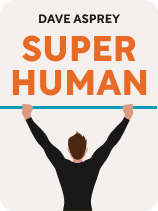

This article is an excerpt from the Shortform book guide to "Super Human" by Dave Asprey. Shortform has the world's best summaries and analyses of books you should be reading.
Like this article? Sign up for a free trial here.
What causes biological aging? Can you get the upper hand on these causes and live longer?
As you age, several factors undermine your health and accelerate your aging. But, Dave Asprey argues that you can turn this around by making dietary changes, adjusting your lifestyle, or seeking medical interventions.
Keep reading for Asprey’s advice on how to live a long life.
How to Live a Long Life
Inefficient mitochondria initiate a cycle that accelerates biological aging. According to Asprey, there are six factors that contribute to this damaging cycle:
- Inflammatory foods
- Imbalanced gut bacteria
- Excess metals in your body
- Sleep deprivation
- Hormonal imbalances
- Stem cell deficiencies
Fortunately, according to Asprey, it’s possible to overcome each of these factors and replace a damaging cycle with a more rejuvenating one—one that repairs cellular damage, optimizes overall health, decelerates biological aging, and extends your lifespan. Here’s how to live a long life, according to Asprey.
Tip #1: Eat Fewer Inflammatory Foods
The food you eat directly impacts the amount of inflammation in your body. Inflammation damages cells and overloads your mitochondria, resulting in fewer antioxidants and more free radicals in your body. According to Asprey, foods that cause inflammation include wheat, grains, gluten, sugar, charred meat, fried foods, and crops sprayed with herbicides that contain glyphosate.
Asprey suggests that, in addition to eliminating inflammatory foods, you can reduce inflammation in your body by implementing four dietary changes:
- Consume antioxidant-rich foods. Good sources of antioxidants include coffee, tea, berries, herbs, spices, and dark chocolate. Additionally, Asprey suggests that you can eliminate excess free radicals from your body by taking antioxidant supplements.
- Replace trans fats with omega-3 fats. Omega-3 fats are found in foods such as olive oil, walnuts, and cold-water fish).
- Balance your protein intake. Asprey recommends eating 0.5 grams of protein a day for every pound you weigh (reduce this figure down to 0.35 grams if you’re overweight). According to him, good sources of protein include wild fish, hemp, and products derived from grass-fed animals. He also suggests that you supplement your daily protein intake with 20 grams of collagen powder.
- Metabolize glucose and ketones.
- Restrict what you eat by following a ketogenic diet for five or six days a week. This involves avoiding carbohydrates (which release sugar into your bloodstream, thereby producing glucose) and eating foods high in fat (which won’t release sugar into your bloodstream, enabling your body to metabolize your stores of fat to produce ketones). Then, for one or two days a week, add 150 grams of low-sugar carbohydrates, which will release sugar into your bloodstream and help your body produce glucose.
- Restrict when you eat by practicing intermittent fasting. This involves limiting your food intake to one six-to-eight-hour period each day.
Tip #2: Balance Your Gut Bacteria
Your gut lining plays a massive part in the health of your immune system because it absorbs necessary nutrients from your bloodstream and prevents toxins from your digestive tract from leaking into your bloodstream. Asprey suggests two methods for rebalancing gut bacteria:
- Add more fiber to your diet. Asprey suggests that you can maximize your production of healthy gut bacteria by eating lots of fibrous vegetables and consuming 10 to 30 grams of powdered fiber each day. Additionally, opting for organic foods will reduce your exposure to the damaging insecticides and antibiotics used in the production of processed foods.
- Reduce your exposure to antibacterial products and antibiotics. Asprey recommends ozone therapy for this. (Shortform note: Learn about possible side effects and the FDA’s warning.)
Tip #3: Reduce Excess Metals in Your Body
Having too many metals in your body interferes with the energy-extraction process mitochondria use to power your cells and often results in mitochondrial dysfunction and mitochondrial death. Asprey says that you’ll do better the more you avoid eating food derived from crops planted in thallium-rich soil, consuming high quantities of oceanic fish, or spending a substantial amount of time under fluorescent lighting.
In addition to avoiding exposure to excess metals from these sources, Asprey suggests that you can detox your body of existing metals by consuming binding agents such as glutathione or activated charcoal. But, he recommends that you seek medical advice before consuming them.
Tip #4: Get Enough Quality Sleep
According to Asprey, sleep deprivation results from missing out on good-quality sleep that maximizes your time in deep sleep (otherwise known as “delta sleep”). This phase of sleep provides many health benefits. Asprey suggests that you can improve the quality of your sleep by making two lifestyle changes:
- Adapt your lighting. Asprey suggests that you can minimize this disruption to your sleep cycle by replacing the lighting in your environment with red bulbs, turning off all screens and dimming your lights two hours before you plan to sleep, and wearing glasses that filter out blue light. He also recommends that you spend ten to twenty minutes in the sun each morning.
- Track your sleeping patterns. Asprey recommends using a sleep tracker that also gathers data from your daytime activities. This type of tracker will reveal how your daytime activities impact the quality of your sleep.
Tip #5: Balance Your Hormones
Hormones help maintain your overall health. Various other factors can disrupt your hormones, such as aging, lack of sleep or nutrition, a sedentary lifestyle, using personal care products made with hormone-disrupting chemicals, and taking prescription medications or hormonal birth control.
Asprey suggests four methods that can help you prevent or reverse hormonal imbalances:
- Engage in high-intensity exercises a few times a week.
- Use natural products.
- When possible, avoid medications with side effects that disrupt hormones.
- Use non-hormonal contraceptives.
If changing your lifestyle doesn’t help to rebalance your hormones, Asprey recommends undertaking bioidentical hormone replacement therapy (BHRT).
Tip #6: Undertake Stem Cell Treatments
Asprey suggests that you can increase your stem cell count and prevent tissue damage by undertaking stem cell treatments. During these treatments, a practitioner extracts and processes healthy stem cells from your subcutaneous fat or bone marrow before reinjecting them into specific areas of your body that require healing. Asprey also recommends freezing healthy stem cells when you’re young so that you can benefit from them when you’re older.
Exercise: How Will You Improve Mitochondrial Efficiency?
Asprey suggests a number of methods to help improve mitochondrial efficiency. In this exercise, consider how you might implement his advice.
- Think about the six causes of mitochondrial efficiency: inflammatory foods, imbalanced gut bacteria, excess metals in your body, sleep deprivation, hormonal imbalances, and stem cell deficiencies. Which one of these factors do you think contributes the most damage to your cellular health?
- Consider Asprey’s description of this particular factor and write down any habits you have that might exacerbate it. (For example, you might think inflammatory foods contribute the most damage to your cellular health because you eat lots of sugary and fried foods.)
- Think about Asprey’s methods for addressing this factor. What one method can you immediately adopt? (For example, you might start taking antioxidant supplements.)
- Which of Asprey’s methods for addressing this factor might be the most difficult to adopt? Explain why. (For example, you might find it difficult to follow a ketogenic diet because you don’t want to give up eating carbohydrates for five days a week.)
- Which of Asprey’s methods do you plan on adopting over the long term and how will you incorporate them into your life?

———End of Preview———
Like what you just read? Read the rest of the world's best book summary and analysis of Dave Asprey's "Super Human" at Shortform.
Here's what you'll find in our full Super Human summary:
- How to grow older without the negative side effects
- A look into the advancements of anti-aging science
- Why a healthy future starts with making changes now






